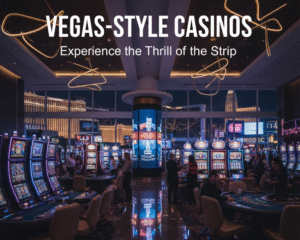Have you ever entered a Psychology of Casinos and have you suffered that excitement? The dazzling lights, the sound of slot machines, the buzz in the air – is intoxicating. But here’s the real question: why do we love casino? Are it just money or is there something deeper in our mind? We go to the fascinating Psychology of Casinos and find out why people continue to return for more information.
The possibility of possibilities
In essence, gambling concerns uncertainty. We humans are wired to enjoy the feeling of not knowing what will happen later. It is the same reason why people who produce a mysterious series of Scream during a Russian mountain ride excites the unknown. Psychology of Casinos benefits from it by offering infinite opportunities in which the result depends on the pure possibility.
The trush of the dopamine
Each turn of the roulette wheel or shot from the locking machine causes a powerful chemical in our brain: dopamine. This “wellness neurotransmitter” peaks when we foresee a reward. It is interesting that it is not the victory itself, but the possibility of winning that excites us more. That’s why even the almost Misser keep the employees: they cheat the brain to think that a victory is coming.
The quasi-manca effect
Imagine that you get two jackpot symbols on a slot machine and miss the third after a room. Frustrating? Yes. But strangely, this also motivates players to continue. Psychologists call it almost missing effect, and it is one of the most powerful tools that casinos use to make us play. It seems that you were “so close”, while in reality the possibility has not changed at all.
The environment of the casino
Psychology of Casinos are not only placed with games, but they are parks of carefully designed psychological games. The lighting, the music, the lack of watches or windows … nothing is random. Everything is built in such a way that you waste time and stay immersed in experience. It is like entering an alternative world in which daily concerns do not exist.
The illusion of control
Have you ever noticed how the players inflate dice, type slot machines or select their own lucky figures? These rituals come from the illusion of control – the belief that personal actions can influence random results. Although the games are purely based on the coincidence, people crave a sense of freedom of choice. This illusion ensures that the games feel personal and fascinating.

The social factor
Casino are also social hubs. Whether it’s cheering for a blackjack table or watching someone affecting a jackpot, people love shared experience. The sense of community, even among strangers, adds a low excitement. It is a bit like if I were in a sports stadium: everyone is entangled in the same emotional Russian mountains.
Evasion and entertainment
For many, casinos do not only concern gambling, but are on the run. Life can feel like routine and stressful, but the casinos offer a break of reality. The flashing lights, live shows and the frying atmosphere of adrenaline bring players in a world full of pleasure and imagination. It’s like entering your own film scene in which everything seems possible for a few hours.
The role of awards and gifts
Psychology of Casinos are masters of reward systems. Free drinks, free hotel stays, loyalty points – These advantages leave players valued and encourage them to play longer. Psychologically, these awards convey feelings of reciprocity, in which players tend to return by returning by spending more tables or machines.
Risk and reward: a human instinct
At a lower level, people are natural risk carriers. The risk has always been associated with the survival and success of the former hunters who pursue the prey to modern stores of stores. The game draws from this original instinct. Is a bet a modern hunt to save the risk of reward or not? This tension allows us to come back.
The History of Hope
Beyond science and design, casinos live from certain people: hope. The dream of transforming a small bet into a jackpot that changes life is irresistible. Even if the chances are slim, the possibility is sufficient to continue this dream. It is the same hope that leads the lottery players, the dreamer and even the adventurers.
Why we continue to play
Why do people come back to casinos? It’s not just about making money. These are emotions – thrill, tension, joy of possibilities. Casinos combine risks, rewards and entertainment to a powerful cocktail with which only a few other experiences can correspond.
Read More: The Rise of Luxury Casinos Around the World
Conclusion
The Psychology of Casinos shows us that the game is much more than money. These are thrills, hope and human instincts. Dopamine highs with carefully designed environments, every detail works together to create an unforgettable experience.



